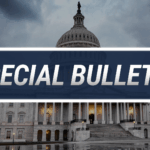EDITOR’S NOTE: Federal legislators have been scrambling this week amid inter- and intra-party squabbles to craft legislation that would avoid a partial shutdown of the federal government as soon as today, when employees would begin enduring furloughs if an agreement isn’t struck.
There is a lot of misunderstanding about the federal debt limit. The debt ceiling or debt limit is an actual limit, imposed by legislation, on the amount of national debt that can be incurred by the U.S. Treasury. It limits how much money the federal government can borrow.
The debt ceiling is an aggregate figure that applies to the gross debt, which includes debt in treasury bonds held by the public.
How did this all start? Well, prior to 1917, when the federal government issued bonds or other debt instruments, it also had to approve legislation authorizing the government to accept responsibility for the debt. As you can imagine, this became a cumbersome process.
In 1917, Congress adopted the Second Liberty Bonds Act, which created an aggregate federal debt limit for bonds. In 1939, the Public Debt Act expanded the debt limit to what we see today.
There is a real misunderstanding about what spending is covered under the federal debt limit. Some think that refusing to raise the debt limit will prevent upcoming legislation. But the debt ceiling applies to federal spending that has already been approved.
I like this analogy: say you decide not to increase your personal debt. You storm around the house, waving your credit card bills around. At the end of the month, your credit card statements come in, and the balances increased, because prior to your current upset, you went to dinner at a nice restaurant and bought a new cell phone.
There are a couple simple solutions to the debt ceiling, but to pass federal budgets and then refuse to pay the debt is like buying something on your credit card then refusing to pay the bill because it is “just too darn high.” When we do this, creditors lower our credit rating, or cancel our ability to use our cards. The impacts on our country to refusing to raise the debt limit are just as painful.
Does failure to raise the debt ceiling mean the federal government shuts down? Not really. The federal government will continue to incur debt. It means that the treasury department will have to begin making cuts that includes things like employee furloughs. Medicare claims and social security payments will certainly continue. If there are cuts, it will almost certainly hurt federal employees and local economies. Cuts would also impact “faith and trust” in our ability to make payments for goods and government services.
Programming Note: Listen to Timothy Powell’s live reports every Tuesday, on Talk Ten Tuesdays, 10 Eastern.






















